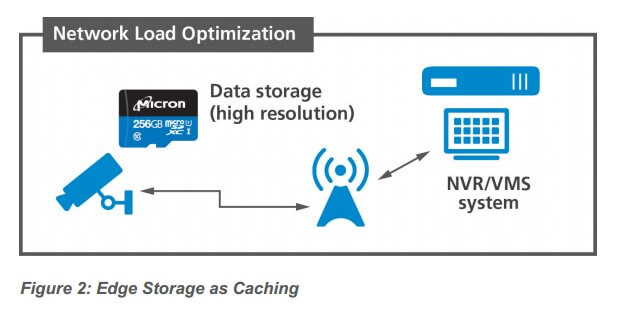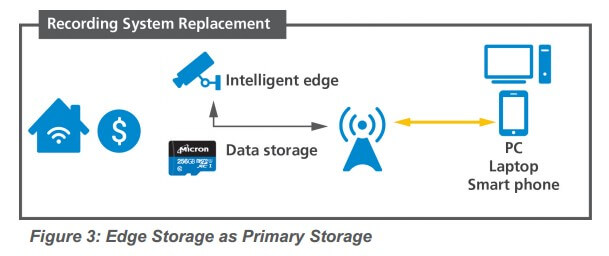Rarely has there been a more exciting and dynamic time to be in the video surveillance industry.
Rarely has there been a more exciting and dynamic time to be in the video surveillance industry. Technological innovations, real-time access, video analytics and affordability are all driving rapid market growth. Many of the same technology advances are also enabling unprecedented possibilities and flexibility in system design—not only from a single device perspective, but also in end-to-end topology deployment. Advanced video storage technology, specifically surveillance-grade edge storage, will play a critical role as a smart, reliable and secure choice in video surveillance applications.
Edge storage is not just for data backup
Today, most edge storage deployments are for enterprise projects and function mainly in one of two use cases: as backup to enhance system reliability (Figure 1), or caching to optimize network traffic and cost (Figure 2).
One of the reasons edge storage is limited to these two use cases is a lack of capacity and high-density storage solutions. If a surveillance device is performing continuous monitoring and recording, a 32GB or 64GB storage device can only hold a few days of video storage before being overwritten. Only when higher density edge storage devices become available and affordable will it become possible to retain multiple weeks of high-resolution video storage.

A new use case: primary storage
Recently, higher-density edge storage solutions have been introduced that can store weeks—or even a month—of full-motion, high-resolution video storage under continuous monitoring, enabling a new use case: primary storage.
In a small/medium business (SMB), a typical topology relies on a local network video recorder (NVR) for data storage and management. However, with infrastructure readiness (cloud management and a VMS app on a phone), a system designer can now use edge storage as primary storage—replacing or eliminating the local NVR. In this use case, edge storage lowers TCO by eliminating the need for a local NVR. It also enhances solution scalability by eliminating the need to upgrade a local NVR and storage when adding new cameras to the system (Figure 3).

Looking forward, smart camera deployments and video surveillance as a service (VSaaS) will be the next mega trends in the video surveillance industry. Machine vision and advanced analytics in smart cameras go beyond traditional video capture and transmission. Equipping intelligent features such as analytics on sensory device input and storage capability in front-end IP cameras will enable a transformation of workloads from back-end to front-end, and, as a result, create headroom on back-end systems to handle more advanced multi-camera/footage analytics. Offloading AI-related functions and storage to front-end smart cameras will lower latency while minimizing network resources (Figure 4). Thus, equipment with edge storage capability could become a mandatory feature in smart cameras.
Challenges
As edge storage evolves from a backup use case to a primary storage use case, some challenges can arise when selecting a solution:
- Storage capacity — Is your edge storage solution able to store up to 2 weeks, or even 1 month, of video archives at the target resolution, with the chosen compression techniques? In today’s video surveillance industry, 1080p resolution is a basic requirement for an IP camera, and 4K will likely be so in the future. With continuous recording of high-quality surveillance video, you will need a higher density storage device to meet basic data storage and archiving requirements.
- Endurance and quality — Will your edge storage solution have the rigor and design longevity to last 3 or more years in the field? The typical surveillance solution needs to be ruggedized, near all-weather resistant. To reduce maintenance and decommission costs during service years and to control TCO, a high-endurance device with surveillance-grade edge storage is essential.
- Recording performance — Does your edge storage solution meet your service level agreement (SLA) for data quality? Continuous video recording into a storage device can cause frame drop issues. Your edge storage device must optimize its recording performance for surveillance usage to reduce the risk of data loss.
Micron’s ultra high-density surveillance-grade edge storage solutions
Micron’s surveillance-grade edge storage is built on industry-leading 64-layer Micron 3D TLC NAND technology. Our newly released and highly dense memory devices enable greater capacity in a smaller space—with more effective power usage—enabling up to 30 days of surveillance video storage in the camera itself, depending on bit rate and hours of recording per day (Figure 5).
Surveillance-grade edge storage
Specifically designed for IP video surveillance workloads, Micron’s industrial microSD cards feature:
- Storage densities of 32GB, 64GB, 128GB and 256GB, enabling more video to be stored at the edge and giving system designers increased flexibility
- Three years of high-quality, continuous, 24x7 video recording in a wide range of temperatures and environments
- Two million hours mean-time-to-failure (MTTF), or 0.44% annualized failure rate (AFR), which is equal to or better than most surveillance hard disk drives
- Special firmware designed for continuous video recording that minimizes frame drops and video capture
- Technology to self-monitor and provide usage information and expected useful life remaining
How to select a suitable microSD card
Micron has developed a storage calculator tool that enables you to select the best surveillance-grade microSD card for your project. By entering four key parameters, we provide you with our recommendation for a best-fit solution:
- Average recording bit rate (for example, 4 Mb/s)
- Average recording hours per day (for example, 8 hours)
- Minimum required video storage in days (for example, 14 days)
- Expected project / contract life time in years (for example, 3 years)
Ready to adopt edge storage?
Click the icon to learn more about Micron's Surveillance Edge Storage Capacity Estimator
About Micron
Micron is an industry leader in innovative memory and storage solutions. Through their global brands — Micron, Crucial, and Ballistix — their broad portfolio of high-performance memory and storage technologies, including DRAM, NAND, NOR Flash, and 3D XPoint memory, is transforming how the world uses information to enrich life. Backed by nearly 40 years of technology leadership, Micron’s memory and storage solutions enable disruptive trends, including artificial intelligence, machine learning and autonomous vehicles in key market segments like cloud, data center, networking, and mobile. Micron’s common stock is traded on the NASDAQ under the MU symbol.